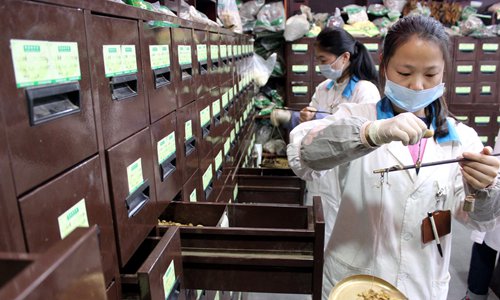Update: Beijing authority could revise controversial TCM regulation, official says

Pharmacists dispense traditional Chinese medicine (TCM) at a TCM pharmacy in Suzhou, East China's Jiangsu Province. File Photo: VCG
Beijing traditional Chinese medicine (TCM) authorities addressed the controversy over draft regulations which appeared to indicate that people who question the efficacy of TCM would be punished, saying it was a misinterpretation and that they could revise or delete some clauses in the draft regulations in response to the controversy.
Beijing is seeking public opinion on draft regulations on TCM, which bans any person or organization from exaggerating the efficacy of TCM or using TCM to make improper profits, but also seeks to punish those who "defame" or "stigmatize" TCM.
The draft law aims to regulate the industry, support the industry's development and call for standard procedures to control the quality of TCM, but it sparked controversy as some believe the core issue when it comes to regulating the TCM industry should be cracking down on fake medicines and unqualified doctors, rather than punishing those who question TCM.
An official of the Beijing Administration of Traditional Chinese Medicine told The Beijing News on Thursday that the public misinterpreted the controversial clause. The official said reasonable questions against TCM are accepted.
"'Questioning' and 'slander' are different concepts," the official said.
There are preconditions on punishment against people who slander TCM in the draft, the official said. "If people stir up quarrels and disturb public order, they shall be accused of violation of public security administration, and only if people commit a crime will they be prosecuted," said the official.
The official noted that the draft is now seeking public opinion and the authority could revise or delete some clauses after evaluation.
The final version of the regulations is expected to be formally released in September, said the official.
The response came after the Beijing health authority website recently issued the draft which calls for standard procedures and organizations to review and evaluate TCM-related products and industry employees.
According to the draft, TCM service institutes that violate national regulations would be punished.
However, the draft regulations triggered controversy on Chinese social media on Tuesday as they would regulate punishment for those who defame or stigmatize TCM.
Some netizens said they understand the move is aimed at promoting TCM, but what should be addressed is the problem of fake medicines and unqualified doctors, which damage the reputation of the TCM sector and cause people to doubt the TCM's effectiveness.
Meanwhile, it is difficult to define the behavior of defamation and stigmatization against the medicine.
"Would I be punished if I say a certain TCM product is useless after I use it?" one netizen questioned.
Xie Zhiyong, a law professor at the China University of Political Science and Law in Beijing, also calls for more detailed regulations as the law enforcement organs, which have discretionary power over related cases, are not experts on medical issues, thus they could fail to make a fair and correct judgment if the clause is not clear enough.
The draft regulations come amid a long-standing controversy over the efficacy and safety of TCM..
Chinese experts and doctors recently provided clinical trial data on the efficacy and safety of traditional Chinese medicine Lianhua Qingwen capsules on COVID-19 patients, which show that the capsules can apparently relieve symptoms and increase the cure rate of patients with mild symptoms.
Cui Yongqiang, a professor with Guang'anmen Hospital Affiliated to the China Academy of Chinese Medical Sciences, noted that Beijing wants to regulate the TCM industry because of the lack of strict supervision and crooked promotion. "Those are the things that make people dislike TCM."
A significant way to make people trust and understand TCM is through scientific popularization and wide exchange, Cui told the Global Times on Tuesday.
"The evaluation criteria of TCM and modern medicine are different. Opponents of TCM should try to look beyond the scope of modern medicine when understanding TCM.
"Neither TCM nor modern medicine is omnipotent. Trusting TCM does not mean ignoring the other. There are many hospitals that use TCM methods. The fact is that the integration of the two has played an important role in the battle against the coronavirus," Cui noted.